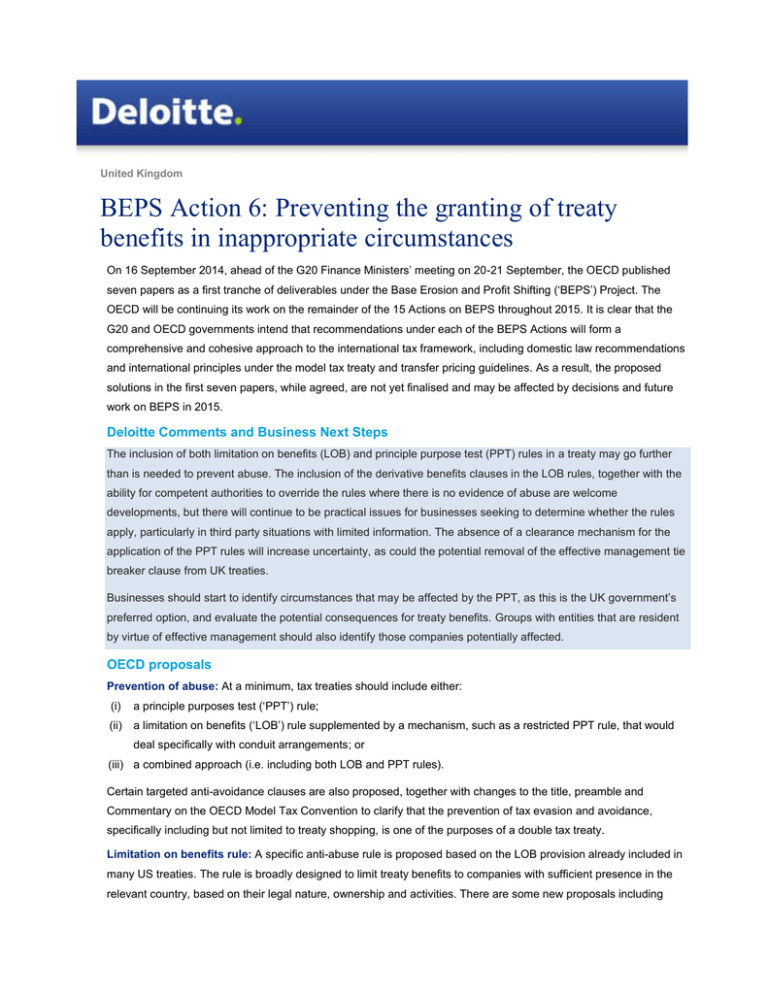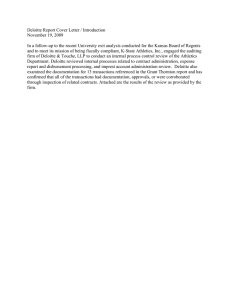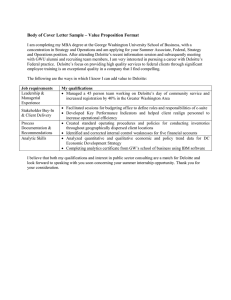
United Kingdom
BEPS Action 6: Preventing the granting of treaty
benefits in inappropriate circumstances
On 16 September 2014, ahead of the G20 Finance Ministers’ meeting on 20-21 September, the OECD published
seven papers as a first tranche of deliverables under the Base Erosion and Profit Shifting (‘BEPS’) Project. The
OECD will be continuing its work on the remainder of the 15 Actions on BEPS throughout 2015. It is clear that the
G20 and OECD governments intend that recommendations under each of the BEPS Actions will form a
comprehensive and cohesive approach to the international tax framework, including domestic law recommendations
and international principles under the model tax treaty and transfer pricing guidelines. As a result, the proposed
solutions in the first seven papers, while agreed, are not yet finalised and may be affected by decisions and future
work on BEPS in 2015.
Deloitte Comments and Business Next Steps
The inclusion of both limitation on benefits (LOB) and principle purpose test (PPT) rules in a treaty may go further
than is needed to prevent abuse. The inclusion of the derivative benefits clauses in the LOB rules, together with the
ability for competent authorities to override the rules where there is no evidence of abuse are welcome
developments, but there will continue to be practical issues for businesses seeking to determine whether the rules
apply, particularly in third party situations with limited information. The absence of a clearance mechanism for the
application of the PPT rules will increase uncertainty, as could the potential removal of the effective management tie
breaker clause from UK treaties.
Businesses should start to identify circumstances that may be affected by the PPT, as this is the UK government’s
preferred option, and evaluate the potential consequences for treaty benefits. Groups with entities that are resident
by virtue of effective management should also identify those companies potentially affected.
OECD proposals
Prevention of abuse: At a minimum, tax treaties should include either:
(i)
a principle purposes test (‘PPT’) rule;
(ii)
a limitation on benefits (‘LOB’) rule supplemented by a mechanism, such as a restricted PPT rule, that would
deal specifically with conduit arrangements; or
(iii) a combined approach (i.e. including both LOB and PPT rules).
Certain targeted anti-avoidance clauses are also proposed, together with changes to the title, preamble and
Commentary on the OECD Model Tax Convention to clarify that the prevention of tax evasion and avoidance,
specifically including but not limited to treaty shopping, is one of the purposes of a double tax treaty.
Limitation on benefits rule: A specific anti-abuse rule is proposed based on the LOB provision already included in
many US treaties. The rule is broadly designed to limit treaty benefits to companies with sufficient presence in the
relevant country, based on their legal nature, ownership and activities. There are some new proposals including
optional clauses on the treatment of Collective Investment Vehicles (‘CIVs’); competent authorities’ considerations
for discretionary relief; and the ability to take into account regional groups (e.g. the European Union) when drafting
clauses. There are also proposed amendments to the Commentary on the OECD Model Tax Convention, such as
discussion of what constitutes an ‘active business’ for the purposes of LOB, which indicates that a company
functioning solely as a headquarters company could have difficulties in meeting the test.
LOB – derivative benefits clause: The LOB proposals provisionally include a ‘derivative benefits’ clause, which
would allow a treaty country to look through to the shareholders where the shareholders would also be entitled to
benefits under a treaty. Negotiating states would be given the flexibility to restrict the clause to dividend income. The
inclusion of the derivative benefits clause is based on an assumption that other BEPS Actions will address specific
concerns which may arise from its inclusion, and this will therefore be re-examined in 2015.
Principle purposes test rule: The paper proposes a broadly drafted general purpose rule aimed at removing treaty
benefits where one of the principal purposes of arrangements or transactions is to obtain treaty benefits.
Determining treaty residence: The existing ‘place of effective management’ tie-breaker clause for determining
treaty residence is to be replaced by a requirement that the competent authorities of the two countries endeavour to
determine residence. Countries which share the view that the ‘place of effective management’ rule was not being
abused can continue to use it. However there are indications that the UK government has a preference for the
competent authority approach, as demonstrated by the 2008 UK-Netherlands treaty.
Minimum shareholding period re dividends: Reduced rates of withholding tax applicable to non-portfolio
dividends will be restricted to shareholdings that are owned throughout a 365-day period that includes the date of
the dividend payment, taking into account any internal reorganisations in the period.
Withholding taxes on payments to permanent establishments: There will be restriction of relief from withholding
taxes on payments to a permanent establishment in a third country with a low rate of tax, where the permanent
establishment’s profits are exempt from tax in the resident country.
Timetable
Further work will be undertaken in 2015 ahead of the multilateral instrument to implement changes, in particular in
respect of the treatment of CIV and non-CIV funds, and on the implementation of minimum standards.
Contacts
Bill Dodwell
Tel: 020 7007 0848
Email: bdodwell@deloitte.co.uk
Joanne Bentley
Tel: 020 7007 3646
Email: jcbentley@deloitte.co.uk
Joanne Pleasant
Tel: 020 7007 3409
Email: jmpleasant@deloitte.co.uk
David Hume
Tel: 020 7007 0859
Email: dahume@deloitte.co.uk
Simon Cooper
Tel: 020 7007 0982
Email: sjcooper@deloitte.co.uk
Alison Lobb
Tel: 020 7007 0497
Email: alobb@deloitte.co.uk
Deloitte refers to one or more of Deloitte Touche Tohmatsu Limited (“DTTL”), a UK private company limited by guarantee, and its
network of member firms, each of which is a legally separate and independent entity. Please see www.deloitte.co.uk/about for a
detailed description of the legal structure of DTTL and its member firms. Deloitte LLP is the United Kingdom member firm of DTTL.
Deloitte LLP is a limited liability partnership registered in England and Wales with registered number OC303675 and its registered
office at 2 New Street Square, London EC4A 3BZ, United Kingdom. Tel: +44 (0) 20 7936 3000 Fax: +44 (0) 20 7583 1198.
This publication has been written in general terms and therefore cannot be relied on to cover specific situations; application of the
principles set out will depend upon the particular circumstances involved and we recommend that you obtain professional advice
before acting or refraining from acting on any of the contents of this publication. Deloitte LLP would be pleased to advise readers on
how to apply the principles set out in this publication to their specific circumstances. Deloitte LLP accepts no duty of care or liability
for any loss occasioned to any person acting or refraining from action as a result of any material in this publication.
© 2014 Deloitte LLP. All rights reserved. Member of Deloitte Touche Tohmatsu Limited




